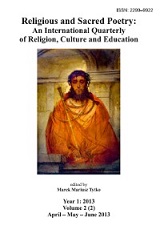Greek Culture and Language in the History of Central and Eastern Europe (Germany, Poland, Silesia). Woman in Greek Poetry Written by Silesians in the
Greek Culture and Language in the History of Central and Eastern Europe (Germany, Poland, Silesia). Woman in Greek Poetry Written by Silesians in the
Author(s): Beata Maria GajSubject(s): Language and Literature Studies
Published by: Fundacja Naukowa Katolików »Eschaton«
Keywords: ancient Greek; history of Central and Eastern Europe; Silesian literature in Greek; women’s history at the beginning of modernity
Summary/Abstract: The main idea of the paper is the rarely investigated holistic issue of the literary, historical and cultural influence of ancient Greece on the nations of Central and Eastern Europe from the beginnings of their statehood up until modern times. Special attention is paid to three crucial centuries: 15th, 16th and 17th when Greek was taught in Central Europe; works of this era created in this language by the Germans, the Polish and the Silesians have survived up to the present day as old prints in special collections of many libraries. However, so far not much attention has been paid to them, while some of these works, written especially in Silesia, constitute interesting examples of occasional literature, different from the more common literature found in that region of Europe, New-Latin literature. Special emphasis shall be put particularly on works by Ursinus Velius, who also willingly brought up women’s issues, using Greek language to create and pass on to posterity the ideal of Silesian woman having Venus’s beauty, the goddess of persuasion Peitho – Πείθω’s pro-nunciation, Calliope’s maturity, Themis’s mind and Minerva’s palms. The Silesian humanists published their works in Latin more often than in Polish and German, and it should be taken into consideration that the fluency and literary knowledge of Greek at that time in Europe was, using Polish historian Henryk Barycz's comparison, as prestigious as the study of nuclear physics was in the middle of the 20th century. The presented paper also addresses the historical contacts and re-lations between Greece and the aforementioned part of Europe in modern times, especially after World War II, when a number of Greek people settled in Poland, including Silesia.
Journal: Religious and Sacred Poetry: An International Quarterly of Religion, Culture and Education
- Issue Year: 2013
- Issue No: 2
- Page Range: 57-66
- Page Count: 10
- Language: English

